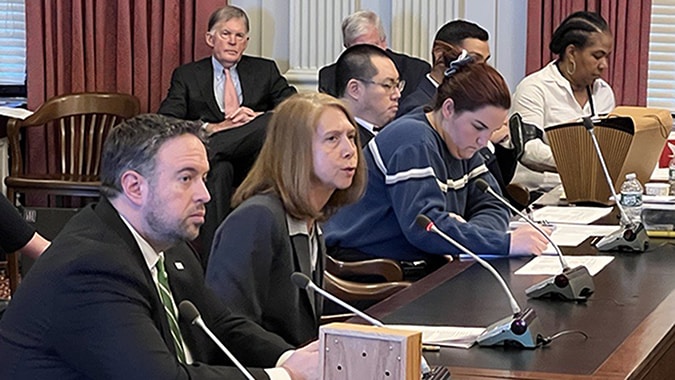NJBIA President & CEO Michele Siekerka told the Assembly Budget Committee on Monday the governor’s proposed $1 billion corporate tax increase on New Jersey’s largest job-creators breaks a promise to the business community and must be removed from the FY25 budget plan.
Siekerka noted that just a few weeks ago Gov. Phil Murphy reiterated his long-standing pledge to sunset the temporary 2.5% surcharge on the Corporation Business Tax to bring the rate back down to 9%. Yet in his new $55.9 billion budget proposal, he effectively increases corporate taxes again to 11.5% by adding a new, permanent 2.5% corporate mass transit fee that is retroactive to Jan. 1 when the temporary CBT surcharge expired.
“Governor Murphy specifically stated that when it comes to sunsetting the CBT surcharge we need to be cold-blooded about our economic development strategy,” Siekerka said. “And he said that just two weeks before presenting the budget. What has changed?
“Businesses make long-term investments and decisions based upon having predictability and reliability for the environment within which they are operating,” Siekerka said. “No one makes a major investment in the wake of undefined and undetermined change. This policy shift is an undetermined change, and it has a massive impact on businesses’ ability to make decisions in the short and long term.
Existing New Jersey businesses “banked on that sunset because they were going to make investments this year,” Siekerka said. “The perception that our policymakers can change their mind overnight after firm promises are made is a massive deterrent to those seeking to grow, invest or relocate to New Jersey. Simply put, a promise matters and your words matter in order for businesses to make decisions.”
Siekerka noted New Jersey is the only state in the nation that is in the top tier for four major taxes: the corporate business tax, the individual income tax, the sales tax and property taxes. New Jersey will be placed at an even greater competitive disadvantage she said, noting that nearby Pennsylvania is now on path to reduce its corporate tax rate to 4.99% by 2031 without increasing taxes on businesses in its next budget.
Moreover, New Jersey’s proposed mass transit fee on businesses is a permanent tax, unlike the temporary 2.5% CBT surcharge it replaces, she pointed out.
“This is worse than the temporary surcharge … because it’s a double hit,” she said. “It hits them on their cash, and it also hits them on their deferred tax liability, which will negatively impact a company’s balance sheet. And for publicly traded companies, that has an impact on their stock price as well.”
NJBIA Chief Government Affairs Officer Christopher Emigholz also submitted written testimony to the Assembly Budget Committee that noted the cumulative impact of the $1 billion increase in corporate income taxes, the proposed increase in the gasoline tax, schedule transit fare and toll hikes and the governor’s new proposed tax on trucks entering warehouse facilities.
Emigholz said taxpayers need to see a “transparent and holistic plan on transportation funding,” especially since there are billions of federal dollars coming to the state for transportation.
“Why is any increase needed, and what is that potential increase going for, and what tax/fee increases are truly needed and have the least and most impact on our economic growth?” Emigholz asked in his written testimony.
Emigholz said the truck tax and the corporate mass transit fee were unnecessary and would undermine economic growth in the state.
To read Emigholz’s entire testimony, go here.

